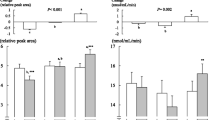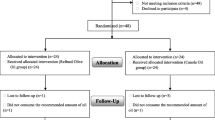Abstract
Lipoprotein-associated phospholipase A2 (Lp-PLA2) is an enzyme which binds to oxidized LDL and has a pro-inflammatory role in the pathogenesis of atherosclerosis. The Lp-PLA2 Studies Collaboration showed the relationship between Lp-PLA2 levels and activity with coronary heart disease and ischemic stroke. Levels and activity of Lp-PLA2 are reduced by statins. There have been limited studies focused on dietary factors and effects on LpPLA2. A recent article from the Nurses’ Health Study (HNS) and the Health Professionals Follow-up Study (HPFS) has provided interesting insights. In this cross sectional study, a lower LpPLA2 activity was found to be related to several dietary factors including higher percentage of energy consumed as protein instead of carbohydrate, mild to moderate intake of alcohol, higher mono-unsaturated fat intake instead of carbohydrate, and not being overweight. It is unknown whether changes in Lp-PLA2 by diet alter cardiovascular risk.

Similar content being viewed by others
References
Papers of particular interest, published recently, have been highlighted as: • Of importance •• Of major importance
Stewart RA, White HD. The role of lipoprotein-associated phospholipase a(2) as a marker and potential therapeutic target in atherosclerosis. Curr Atheroscler Rep. 2011;13:132–7.
Rosenson RS. Physiochemically modified apolipoprotein B-containing lipoproteins and the risk of cardiovascular disease. J Intern Med. 2010;268:316–9.
•• Lavi S, McConnell JP, Rihal CS, et al. Local production of lipoprotein-associated phospholipase A2 and lysophosphatidylcholine in the coronary circulation: association with early coronary atherosclerosis and endothelial dysfunction in humans. Circulation 2007;115:2715–21. This study examined Lp-PLA 2 concentrations sampled simultaneously in the human coronary ostia and the coronary sinus. The study demonstrated a net increase in Lp-PLA 2 levels as blood traversed the coronary vascular bed with significant atherosclerotic plaque, and a decrease in Lp-PLA 2 levels when coronary plaques were absent. This study also showed that the lysophosphatidylcholine produced by Lp-PLA 2 -mediated hydrolysis of oxidized LDL was highly associated with coronary artery endothelial dysfunction.
Kolodgie FD, Burke AP, Skorija KS, et al. Lipoprotein-associated phospholipase A2 protein expression in the natural progression of human coronary atherosclerosis. Arterioscler Thromb Vasc Biol. 2006;26:2523–9.
Mannheim D, Herrmann J, Versari D, et al. Enhanced expression of Lp-PLA2 and lysophosphatidylcholine in symptomatic carotid atherosclerotic plaques. Stroke. 2008;39:1448–55.
•• The Lp-PLA2 Studies Collaboration. Lipoprotein-associated phospholipase A2 and risk of coronary disease, stroke, and mortality: collaborative analysis of 32 prospective studies. Lancet 2010;375:1536–44. This is an important meta-analysis confirming the association between Lp-PLA 2 and vascular disease, including stroke.
• Persson M, Nilsson JA, Nelson JJ, Hedblad B, Berglund G. The epidemiology of Lp-PLA(2): distribution and correlation with cardiovascular risk factors in a population-based cohort. Atherosclerosis 2007;190:388–96. This is a large epidemiologic study in a healthy population.
•• Jang Y, Waterworth D, Lee JE, et al. Carriage of the V279F Null Allele within the Gene Encoding Lp-PLA(2) Is Protective from Coronary Artery Disease in South Korean Males. PLoS One 2011;6:e18208. This study showed that natural deficiency in Lp-PLA 2 activity due to carriage of PLA2G7 279F allele protected Korean men from coronary artery disease, thus providing evidence for a causal relationship between Lp-PLA 2 and coronary disease.
•• Heart Protection Study Collaborative Group. Lipoprotein-associated phospholipase A2 activity and mass in relation to vascular disease and nonvascular mortality. J Intern Med 2010;268:348–58. This study analyzed apoB in the outcome model.
• White HD, Held C, Stewart RA, et al. Study design and rationale for the clinical outcomes of the STABILITY Trial (STabilisation of Atherosclerotic plaque By Initiation of darapLadIb TherapY) comparing darapladib versus placebo in patients with clinical coronary heart disease. Am Heart J 2010;160:655–61. This article explains the rationale and design of a 15,800 patient, event-driven, outcome study testing darapladib, which inhibits Lp-PLA 2 .
Davidson MH, Corson MA, Alberts MJ, et al. Consensus panel recommendation for incorporating lipoprotein-associated phospholipase A2 testing into cardiovascular disease risk assessment guidelines. Am J Cardiol. 2008;101:51F–7F.
Saougos VG, Tambaki AP, Kalogirou M, et al. Differential effect of hypolipidemic drugs on lipoprotein-associated phospholipase A2. Arterioscler Thromb Vasc Biol. 2007;27:2236–43.
Muhlestein JB, May HT, Jensen JR, et al. The reduction of inflammatory biomarkers by statin, fibrate, and combination therapy among diabetic patients with mixed dyslipidemia: the DIACOR (Diabetes and Combined Lipid Therapy Regimen) study. J Am Coll Cardiol. 2006;48:396–401.
• Schaefer EJ, McNamara JR, Asztalos BF, et al. Effects of atorvastatin versus other statins on fasting and postprandial C-reactive protein and lipoprotein-associated phospholipase A2 in patients with coronary heart disease versus control subjects. Am J Cardiol 2005;95:1025–32. Patients had 51% higher median hs-CRP values and 29% higher mean Lp-PLA 2 values than did controls (P < 0.05 for hs-CRP and Lp-PLA 2 ) in the fasting state; however, Lp-PLA 2 values were 62% higher (P < 0.0001) in the fed state in patients compared with controls.
Kuvin JT, Dave DM, Sliney KA, et al. Effects of extended-release niacin on lipoprotein particle size, distribution, and inflammatory markers in patients with coronary artery disease. Am J Cardiol. 2006;98:743–5.
Filippatos TD, Gazi IF, Liberopoulos EN, et al. The effect of orlistat and fenofibrate, alone or in combination, on small dense LDL and lipoprotein-associated phospholipase A2 in obese patients with metabolic syndrome. Atherosclerosis. 2007;193:428–37.
White HD. Darapladib and its potential for plaque stabilization and prevention of cardiac events. Clinical Lipidology. 2010;5:465–76.
O’Donoghue ML, Braunwald E, White HD, Serruys P, et al. Study design and rationale for the SOLID-TIMI 52 (Stabilization Of pLaques usIng Darapladib - Thrombolysis in Myocardial Infarction) Trial in patients after an acute coronary syndrome. Am Heart J. 2011;in press.
•• Hatoum IJ, Nelson JJ, Cook NR, Hu FB, Rimm EB. Dietary, lifestyle, and clinical predictors of lipoprotein-associated phospholipase A2 activity in individuals without coronary artery disease. Am J Clin Nutr 2010;91:786–93. This is the only large-scale study on dietary factors on Lp-PLA 2 .
Wolfe BM, Giovannetti PM. Short-term effects of substituting protein for carbohydrate in the diets of moderately hypercholesterolemic human subjects. Metabolism. 1991;40:338–43.
Brinton EA. Effects of ethanol intake on lipoproteins and atherosclerosis. Curr Opin Lipidol. 2010;21:346–51.
Tzotzas T, Filippatos TD, Triantos A, Bruckert E, Tselepis AD, Kiortsis DN. Effects of a low-calorie diet associated with weight loss on lipoprotein-associated phospholipase A2 (Lp-PLA2) activity in healthy obese women. Nutr Metab Cardiovasc Dis. 2008;18:477–82.
Braun LT, Davidson MH. Lp-PLA2: A new target for statin therapy. Curr Atheroscler Rep. 2010;12:29–33.
Pedersen MW, Koenig W, Christensen JH, Schmidt EB. The effect of marine n-3 fatty acids in different doses on plasma concentrations of Lp-PLA2 in healthy adults. Eur J Nutr. 2009;48:1–5.
Kim DH, Jung SJ, Chung IS, et al. Ergosterol peroxide from flowers of Erigeron annuus L. as an anti-atherosclerosis agent. Arch Pharm Res. 2005;28:541–5.
Acknowledgments
We would like to thank Charlene Nell, Team Support Administrator, Green Lane Cardiovascular Research Unit, for excellent secretarial assistance.
Disclosure
C-K. Wong: none; H.D. White has received grants from Sanofi-Aventis, Eli Lilly, Merck Sharpe & Dohme, The Medicines Company, NIH, Neuren Pharma, GlaxoSmithKline, Pfizer, Roche, Johnson & Johnson, Proctor & Gamble and Schering Plough; and has received consulting fees or honorarium from Sanofi-Aventis, Neuren Pharma, GlaxoSmithKline, CSL Limited, and Bayer.
Author information
Authors and Affiliations
Corresponding author
Rights and permissions
About this article
Cite this article
Wong, CK., White, H.D. Effects of Dietary Factors on Lipoprotein-Associated Phospholipase A2 (Lp-PLA2). Curr Atheroscler Rep 13, 461–466 (2011). https://doi.org/10.1007/s11883-011-0201-4
Published:
Issue Date:
DOI: https://doi.org/10.1007/s11883-011-0201-4




